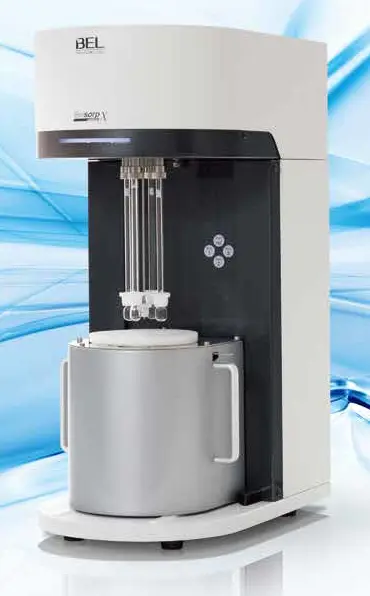Mesures de surface spécifique

Les définitions des termes surface, aire, superficie.
The term surface area is used in many applications, and has many meanings.
- External surface area of an object
- The geometric surface area defining the external boundary of a solid object, or a quantity of powder or granules.
- Accessible external surface area
- The part of the external surface area which gas, liquid or some other medium can access. This is especially important when the rate of a reaction is limited by the amount of material arriving at the surface of the sample. Parts of the external surface may be inaccessible because of a coating, or because the sample is mounted in some container or fixture, as in MVTR measurements.
- Microscopic surface area
-
The surface area including:
- the external area of all particles
- the extra area due to surface roughness
- area inside large and small pores
- Inaccessible surface area
- the area inside closed pores or voids which cannot be reached by the medium used for a measurement.
- Specific Surface Area, SSA
- The surface area per unit mass of a material or substance.
Additionally, it is common to refer to specific area values obtained by particular experimental methods. Some of these are described below.
Methods for measurement of surface area
Adsorption methods for measurement of surface area
Measure the quantity of adsorption of some molecule, and use a model describing how the molecule interacts with the surface.
The chosen molecule will interact with more or less of the microscopic surface depending on the size and interaction strength. Adsorptive may include
- Dye molecules in liquid solutions
- Vapours or gases which adsorb reversibly
- Gases which chemisorb irreversibly
Simple monolayer adsorption
Assume that the adsorptive forms a single monolayer with a known surface area associated with each molecule.
- Methylene Blue surface area uses dye adsorption for surface area of soils.
- Iodine Adsorption Number (IAN) of carbon black materials. Actually measured as milligrams of iodine per gramme of sample, it is commonly converted to a Specific surface area value.
Adsorption Isotherm models
Adsorption isotherms may be measured for :
- pure vapours adsorbing at different pressures :
- at their normal boiling point temperature. For example, N2 at 77 K, Ar at 87 K.
- at lower temperatures, such as Krypton at 77 K, where \(P_0\) is only approximately 330 Pa.
- at higher temperatures, such as CO2 at 0 °C, where \(P_0\) is 3425 kPa.
- vapours in carrier gas, as in Dynamic Vapour Sorption with air of varying humidity.
- Titration of liquid solutions of known concentration.
Monolayer models apply where the adsorption is limited at a single monolayer:
- Langmuir isotherm
- Freundlich isotherm
Multilayer models describe progressive formation of multiple layers of molecules on the surface.
- BET isotherm
- t-plot
- alpha-s
- Note :
- It is important to note that the BET model is frequently used to obtain a surface area value for microporous materials, where the pore size is so small that the formation of a multilayer is strictly impossible. The relationship between the obtained “Area” and any real surface found in the material is difficult to describe.
Micropore models describe the enhanced interaction inside pores smaller than 2 nm.
- MP plot
- DA plot
- and many others for specific cases (Horvath-Kawazoe, Saito-Foley, …)
Mesopore models describe the formation of condensed liquid inside pores larger than 2 nm.
- BJH plot
- Dollimore-Heal plot
- and others( … )
Chemisorption methods
Chemisorption is more commonly used to measure a specific type of chemical group on a material, such as the Active Metal Area in a porous catalyst. However, chemisorption can also measure the full surface area of metal powders.
Gas or liquid permeation
For porous materials and packed beds of powders there are models which relate the flow rate of fluid to the surface area. These methods generally do not sample :
- intra particle porosity
- surface roughness
- irregular particle shapes
The Blaine gas permeation method is a typical example of such a method.
Particle dimensional measurement
Dynamic Light scattering, and other methods which give a particle size distribution can be used to derive the surface area for the particle population.
